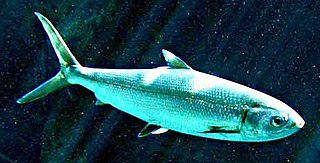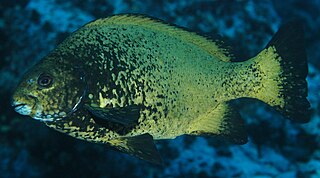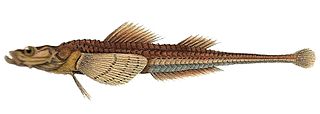
Chanidae is a family of fishes which has a number of fossil genera and one monotypic extant genus which contains the milkfish.

The Carangidae are a family of ray-finned fish that includes the jacks, pompanos, jack mackerels, runners, trevallies, and scads. It is the largest of the six families included within the order Carangiformes. Some authorities classify it as the only family within that order but molecular and anatomical studies indicate that there is a close relationship between this family and the five former Perciform families which make up the Carangiformes.

Trichogaster is a genus of gouramis native to South Asia from Pakistan to Myanmar. It is the only genus in the monotypic subfamily Trichogastrinae as set out in the 5th Edition of Fishes of the World, although that book states that there are two genera, the other being Colisa which is treated as a synonym of Trichogaster by Fishbase and the Catalog of Fishes. Fishbase also places the genus in the Luciocephalinae. Species of this genus are very popular in the aquarium trade.

The sea chubs, also known as rudderfish and pilot fish and in Hawaiian as enenue or nenue, are a family, Kyphosidae, of fishes in the order Perciformes native to the Atlantic, Indian and Pacific Oceans usually close to shore in marine waters.

Oplegnathus is currently the sole recognized genus in the knifejaw family (Oplegnathidae) of marine perciform fishes. The largest, the Cape knifejaw, can reach a maximum length around 90 cm (35 in). Knifejaws have teeth fused into a parrot-like beak in adulthood. They feed on barnacles and mollusks, and are fished commercially. They are native to the Indian and Pacific Oceans.

Caranginae is a subfamily of ray-finned fish from the family Carangidae which consists of twenty genera and 103 species.

Bembridae, the deep-water flatheads, are a family of bottom-dwelling ray-finned fishes. They are found in the Indian and western Pacific Oceans.

The oceanic basslets are ray-finned fish that belong to the small family Howellidae within the superfamily Percoidea of the suborder Percoidei part of the order Perciformes. The family includes about 9 species. They are mostly deep-water species, some of which move to shallower waters at night. Various species are found in the Indian Ocean, Pacific Ocean, including the Coral Sea, and Atlantic Ocean, including the Caribbean Sea.

Parabembras is a genus of marine ray-finned fish belonging to the family Bembridae, the deepwater flatheads, although they are sufficiently different from the other genera in that family to be classified as their own family, Parabembradidae, by some authorities. These fishes are found in the Indian Ocean and the western Pacific Ocean.

Cypsellurinae is a subfamily of flying fishes, one of four in the family Exocoetidae and the only one which is not monogeneric.

The Procatopodini is an African tribe of fishes, it is part of the subfamily Procatopodinae, within the family Poeciliidae.

Trachinotinae is a subfamily of the family Carangidae, the jacks and pompanos.

Scomberoidinae is a subfamily of ray-finned fish from the family Carangidae which consists of three genera and 10 species. The species in this subfamily have been given the common names leatherjacket and queenfish.

Centrarchinae is a subfamily of freshwater ray-finned fish, one of three subfamilies in the family Centrarchidae, the sunfishes.

Sebastolobini is a tribe of marine ray-finned fishes belonging to the subfamily Sebastinae of the family Scorpaenidae in the order Scorpaeniformes. Many species have the common name thornyhead.

Apodichthyinae is a subfamily of marine ray-finned fish belonging to the family Pholidae, the gunnels. These fishes are found in the North Pacific Ocean.
Anoplagoninae is a subfamily of marine ray-finned fishes belonging to the family Agonidae, part of the sculpin superfamily Cottoidea. These fishes are found in the North Pacific Ocean.

Brachyopsinae is a subfamily of marine ray-finned fishes belonging to the family Agonidae, part of the sculpin superfamily Cottoidea. These fishes are found in the North Pacific Ocean.

Agoninae is a subfamily of marine ray-finned fishes belonging to the family Agonidae, part of the sculpin superfamily Cottoidea. These fishes are found in the Pacific and Atlantic Oceans.
Bathyagoninae is a subfamily of marine ray-finned fishes belonging to the family Agonidae, part of the sculpin superfamily Cottoidea. These fishes are found in the Pacific and Atlantic Oceans.


















